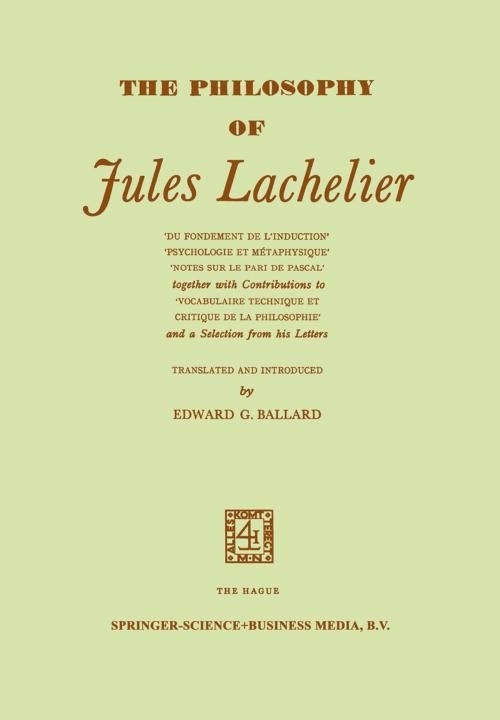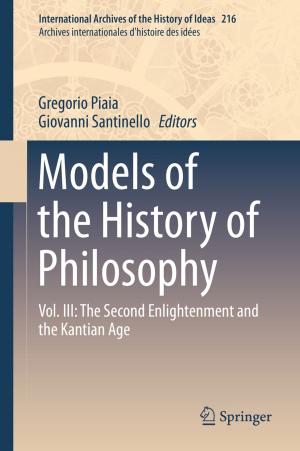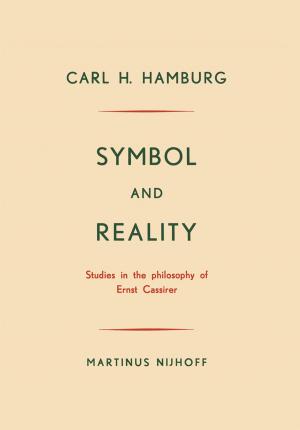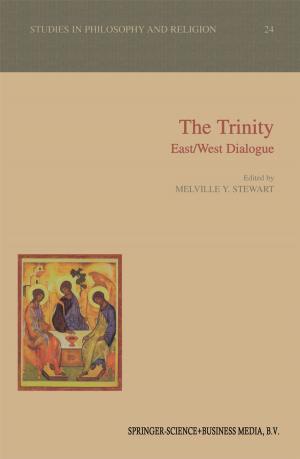The philosophy of Jules Lachelier
Nonfiction, Religion & Spirituality, Philosophy, Epistemology, Metaphysics| Author: | Jules Lachelier | ISBN: | 9789401195225 |
| Publisher: | Springer Netherlands | Publication: | June 29, 2013 |
| Imprint: | Springer | Language: | English |
| Author: | Jules Lachelier |
| ISBN: | 9789401195225 |
| Publisher: | Springer Netherlands |
| Publication: | June 29, 2013 |
| Imprint: | Springer |
| Language: | English |
Gabriel Seailles remarked that Lachelier had the happy for tune "of exercising a profound and decisive influence upon all who heard him, yet without acquiring perhaps a single disciple in the narrow sense of the word. He liberated minds. He rid them of 1 ready-made ideas. " This liberating influence was exercised by means of lecture, conversation, and personal relationship as much as through writing. Its nature is suggested by the character of his better known students, among whom are Boutroux, Bra chard, and Lagneau. Lachelier's writings, however, remain sig nificant and are commonly looked upon by French philosophers as constituting a very important element of their heritage. During his lifetime, Lachelier's position was somewhat ana logous to Victor Cousin's; however, his thinking was far more critical and disciplined than Cousin's and its effect has been all 2 the more fertile. Benrubi places him, along with Ravaisson, as one of the two leading pioneers of the spiritual-metaphysical positivistic movement in France, a movement which provides an interesting contrast to the anti-intellectualism associated with Bergson. Along with Bergson, however, he opposed what has been called "scientism" in philosophy, but he opposed this trend in his own way. R. G. Collingwood, who calls Lachelier one of the greatest of modern French philosophers (cf.
Gabriel Seailles remarked that Lachelier had the happy for tune "of exercising a profound and decisive influence upon all who heard him, yet without acquiring perhaps a single disciple in the narrow sense of the word. He liberated minds. He rid them of 1 ready-made ideas. " This liberating influence was exercised by means of lecture, conversation, and personal relationship as much as through writing. Its nature is suggested by the character of his better known students, among whom are Boutroux, Bra chard, and Lagneau. Lachelier's writings, however, remain sig nificant and are commonly looked upon by French philosophers as constituting a very important element of their heritage. During his lifetime, Lachelier's position was somewhat ana logous to Victor Cousin's; however, his thinking was far more critical and disciplined than Cousin's and its effect has been all 2 the more fertile. Benrubi places him, along with Ravaisson, as one of the two leading pioneers of the spiritual-metaphysical positivistic movement in France, a movement which provides an interesting contrast to the anti-intellectualism associated with Bergson. Along with Bergson, however, he opposed what has been called "scientism" in philosophy, but he opposed this trend in his own way. R. G. Collingwood, who calls Lachelier one of the greatest of modern French philosophers (cf.















